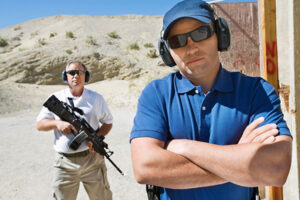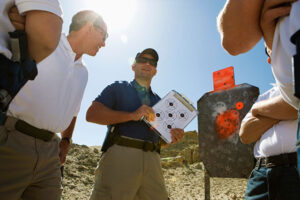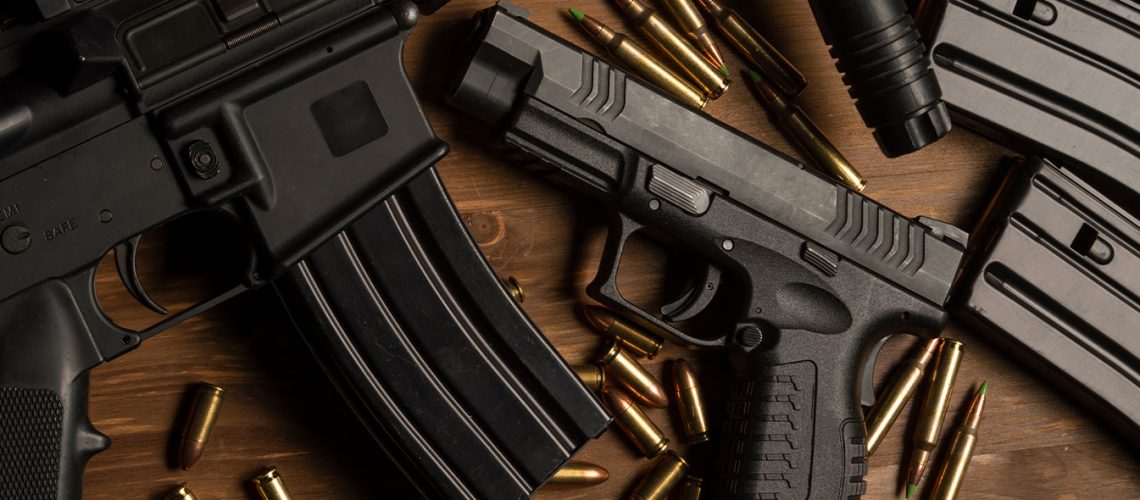Is your gun a firearm? Or is it a weapon?
It’s kinda both. However, the way you use those terms invokes an understanding that goes beyond the simple meanings of the words themselves.
Also, passionate advocates of using one word over another—many from the firearm instruction world—have developed hard and fast preferences when it comes to “weapon” or “firearm”. And they’ve done so with a lot of thought and applicable reasoning.

 Let’s start with the basics. A weapon is anything that can be used to cause harm or injury to another person. So, ALL guns ARE weapons. But a baseball bat is also a weapon. As is a knife. As is a rock. Or a golf club. Or a lawn chair. Or a lamp. If you use them cause bodily harm.
Let’s start with the basics. A weapon is anything that can be used to cause harm or injury to another person. So, ALL guns ARE weapons. But a baseball bat is also a weapon. As is a knife. As is a rock. Or a golf club. Or a lawn chair. Or a lamp. If you use them cause bodily harm.
So the question then becomes, which word is used—and in what context?

 For a long period of time, the military and law enforcement established a practice of using the term “weapon” to describe guns. Why? Consider the bodily harm part of the definition as it concerns the military and law enforcement. In many, if not all
For a long period of time, the military and law enforcement established a practice of using the term “weapon” to describe guns. Why? Consider the bodily harm part of the definition as it concerns the military and law enforcement. In many, if not all, cases, the use of “weapon” was entirely appropriate. But it did, over time, create an impression associated with harm as it concerns firearms.
 Meanwhile, an equal tendency developed for some civilian instructors to use the term “firearm” rather than “weapon”—insisting that legal gun owners don’t carry weapons. They carry legally obtained and owned firearms for the use of self-defense or the defense of others.
Meanwhile, an equal tendency developed for some civilian instructors to use the term “firearm” rather than “weapon”—insisting that legal gun owners don’t carry weapons. They carry legally obtained and owned firearms for the use of self-defense or the defense of others.
To those in the firearm instruction business, it’s an important distinction. Because, many anti-gun types use the term “weapon” to demonize legal firearm owners with that association of harm, or the intent to harm. Certain instructors feel “firearm” more accurately describes a gun, as it’s independent of the function of harm through definition, and can be viewed more as a tool, or product designed to function in a certain manner (hopefully by trained persons following the law.)
Instructors can naturally have strong opinions about what might seem semantic to some, as the very function of instruction is to NOT cause harm unless absolutely necessary to defend yourself or another person. So, instructors are out to keep people from BEING unnecessarily harmed. From basic safety to self-defense.
 Firearms Legal Protection uses the term “firearm” independent of any optics or semantics—or as a shorthand term to mean “gun”.
Firearms Legal Protection uses the term “firearm” independent of any optics or semantics—or as a shorthand term to mean “gun”.
And even though the word “firearm” is in our very name, in the course of our business we make the deliberate choice to use the term “weapon” because we cover all legal weapons used by our members in defense of themselves or another person.

So, whatever term you prefer—whether it’s just your habit, or a carefully chosen term based on strongly held beliefs—know that Firearms Legal Protection stands by its members regardless of the type of legal weapon they use in defense of themselves or others. From gun to tire iron.

